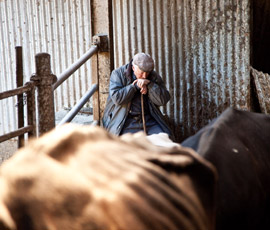Welfare should consider animals’ mental health

A report on farm animal welfare has recommended that animals’ mental health should play a more important role in disease management.
The Farm Animal Welfare Committee (FAWC) released the report, which considers the impact that both physical and mental ill-health can have on the welfare of farmed animals.
It recommends ways that welfare can be improved through effective disease management – as well as high standards of stockmanship, husbandry and using vets whenever necessary.
“The prevalence of many endemic diseases in farm animals is too high and shows little sign of reduction over time,” it says. “This situation must be challenged and not allowed to become normal.”
In particular, it says the stockman has a vital role to play in ensuring a farm health plan is implemented effectively, and early recognition of a disease challenge is critical.
The report says that poor mental health in farm animals can increase the likelihood of disease, as well as being detrimental to welfare.
Key themes to improve farm animal welfare include:
- Greater use of preventative health planning
- Greater involvement of the veterinarian in diagnosis and treatment
- Continuing professional development of all connected with farmed livestock
- Provision of appropriate resources to improve health care
The report also covers the surveillance of animals, suggesting a combined approach from government and other stakeholders is important. It recommends that information from farm assurance and retailer schemes should be shared between bodies at a national level.
Prof Christopher Wathes, chairman of FAWC, said that new partnerships had the opportunity to “stimulate substantial improvement in farm animal health with economic, environmental and farm animal welfare benefits”.
He described the farm veterinary surgeon as the “pivotal link to continual improvements in farm health and welfare”.
The 72-page report was produced within the framework of the FAWC’s “Five Freedoms” – guidelines which it says form the “cornerstone for the welfare of livestock”.
FAWC’S ‘FIVE FREEDOMS’
- Freedom from hunger and thirst, by ready access to fresh water and a diet to maintain full health and vigour.
- Freedom from discomfort, by providing an appropriate environment including shelter and a comfortable resting area.
- Freedom from pain, injury and disease, by prevention or rapid diagnosis and treatment.
- Freedom to express normal behaviour, by providing sufficient space, proper facilities and company of the animal’s own kind.
- Freedom from fear and distress, by ensuring conditions and treatment which avoid mental suffering.
